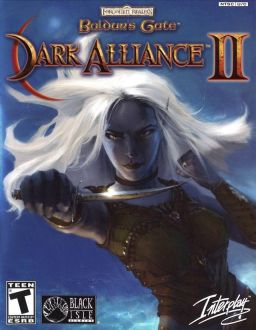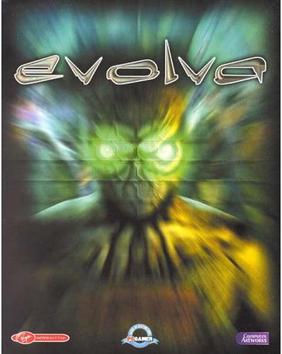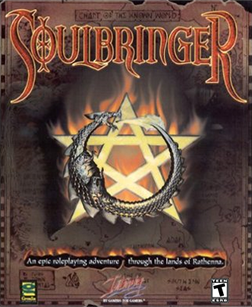
Wasteland is a role-playing video game developed by Interplay Productions and published by Electronic Arts in 1988. The first installment of the Wasteland series, it is set in a futuristic, post-apocalyptic America destroyed by a nuclear holocaust generations before. Developers originally made the game for the Apple II and it was ported to the Commodore 64 and MS-DOS. It was re-released for Microsoft Windows, OS X, and Linux in 2013 via Steam and GOG.com, and in 2014 via Desura. A remastered version titled Wasteland Remastered was released on February 25, 2020, in honor of the original game's 30th anniversary.

Fallout is a media franchise of post-apocalyptic role-playing video games created by Tim Cain and Leonard Boyarsky, at Interplay Entertainment. The series is set during the first half of the 3rd millennium, and its atompunk retrofuturistic setting and artwork are influenced by the post-war culture of the 1950s United States, with its combination of hope for the promises of technology and the lurking fear of nuclear annihilation. Fallout is regarded as a spiritual successor to Wasteland, a 1988 game developed by Interplay Productions.

Interplay Entertainment Corp. is an American video game developer and publisher based in Los Angeles. The company was founded in 1983 as Interplay Productions by developers Brian Fargo, Jay Patel, Troy Worrell, and Rebecca Heineman, as well as investor Chris Wells. As a developer, Interplay is best known as the creator of the Fallout series and as a publisher for the Baldur's Gate and Descent series.

Black Isle Studios is a division of the developer and publisher Interplay Entertainment formed in 1996 that develops role-playing video games. It has published several games from other developers.

Fallout 2 is a 1998 role-playing video game developed by Black Isle Studios and published by Interplay Productions. It is a sequel to Fallout (1997), featuring similar graphics and game mechanics. The game's story takes place in 2241, 80 years after the events of Fallout and 164 years after the atomic war which reduced the vast majority of the world to a nuclear wasteland. The player assumes the role of The Chosen One, the grandchild of the first game's protagonist, and undertakes a quest to save their small village on the West Coast of the United States.

Chris Avellone is an American video game designer and comic book writer. He worked for Interplay and Obsidian Entertainment before becoming a freelance designer and writer. He is best known for his work on role-playing video games such as Planescape: Torment, Star Wars Knights of the Old Republic II: The Sith Lords and the Fallout series.

Baldur's Gate: Dark Alliance II is a 2004 hack and slash action role-playing game for PlayStation 2 and Xbox developed by Black Isle Studios and published by Interplay Entertainment, with distribution handled by Vivendi Universal Games in North America and Avalon Interactive/Acclaim Entertainment in Europe. It is the sequel to the 2001 game Baldur's Gate: Dark Alliance.

MDK2 is a 2000 third-person shooter, action-adventure video game developed by BioWare and published by Interplay Entertainment for the Dreamcast, Windows and PlayStation 2. It is a sequel to the 1997 game MDK. First released for the Dreamcast in March 2000, it was later released for Windows in May, with newly selectable difficulty levels and the ability to manually save. In March 2001, a slightly reworked version, featuring level design modifications and gameplay tweaks, was released for the PlayStation 2 as MDK 2: Armageddon. The PC version was released on GOG.com in September 2008, and on Steam in September 2009. A port of the PlayStation 2 version was released for Wii via WiiWare in 2011. Also in 2011, a HD remastered version was released for Windows. Called MDK2 HD, this version features new 3D models, textures, improved lighting, and remastered music, and was released on Beamdog in October, and on Steam in July 2012.

Van Buren was the codename of a canceled role-playing video game developed by Black Isle Studios. It was intended to be the third game in the mainline Fallout series. Set in the year 2253, the plot of Van Buren revolved around a prisoner who would explore the American Southwest while being chased by robotic prison guards. The main antagonist was a mad scientist named Victor Presper, who planned on using the prisoner as an inadvertent vector to spread a deadly virus. Gameplay would have included a mixture of real-time and turn-based combat. The player would explore the map with a team of non-playable character (NPC) companions. Each NPC would make their own independent decisions which would affect the story.

Fallout is a 1997 role-playing video game developed and published by Interplay Productions, set in a mid-22nd century post-apocalyptic and retro-futuristic world, decades after a nuclear war between the United States and China. Fallout's protagonist, the Vault Dweller, inhabits an underground nuclear shelter. The player must scour the surrounding wasteland for a computer chip that can fix the Vault's failed water supply system. They interact with other survivors, some of whom give them quests, and engage in turn-based combat.

Fallout 3 is a 2008 action role-playing game developed by Bethesda Game Studios and published by Bethesda Softworks. The third major installment in the Fallout series, it is the first game to be developed by Bethesda after acquiring the rights to the franchise from Interplay Entertainment. The game marks a major shift in the series by using 3D graphics and real-time combat, replacing the 2D isometric graphics and turn-based combat of previous installments. It was released worldwide in October 2008 for Microsoft Windows, PlayStation 3, and Xbox 360.

Fallout: Brotherhood of Steel is a 2004 action role-playing game developed and published by Interplay Entertainment. It was released for the PlayStation 2 and Xbox, and was the first entry in the Fallout series to be released for home video game consoles. Set in the year 2208, the player controls an initiate of the Brotherhood of Steel, a militant organization that attempts to bring order to a world that has been decimated by nuclear warfare. Critics often compared Fallout: Brotherhood of Steel to a hack and slash game, due to its emphasis on fast-paced combat and encounters with large groups of enemies. Fallout: Brotherhood of Steel does not feature an open world map like other Fallout games, and is instead linear in design.

Baldur's Gate: Dark Alliance is a 2001 action role-playing video game developed by Snowblind Studios and published by Interplay Entertainment subsidiary Black Isle Studios for the PlayStation 2 and the Xbox consoles, with High Voltage Software handling the GameCube port, and Magic Pockets developing the Game Boy Advance version. CD Projekt was developing a version for Microsoft Windows, but was ultimately cancelled. In 2021, a 4K port of the game was released for the Xbox One, PlayStation 4, PlayStation 5, Xbox Series X/S, Nintendo Switch and PC.

Stronghold: Crusader is the successor to Firefly Studios's 2001 real-time strategy video game Stronghold. Crusader has much in common with the original Stronghold, but differs from its predecessor in the fact that the game is no longer set in England, instead being set in the Middle East during the Crusades. Another prominent addition not found in its predecessor is a skirmish mode in single-player, allowing customized battles with AI opponents instead of the linear campaign. The game was also released as Stronghold Warchest. This version was a compendium of Stronghold and an enhanced version of Stronghold: Crusader, containing additional characters and an additional Crusader Trail.

Evolva is a third-person action game created by British computer artist William Latham and game designer/programmer Mark Atkinson, and released in 2000.

Zax: The Alien Hunter is an isometric shooter video game developed by Reflexive Entertainment, released in September 2001 for Windows.

Soulbringer is a fantasy RPG developed by Gremlin Interactive and published by Interplay Entertainment and Infogrames in 2000. It was later packed and shipped in combination with Interplay's Planescape: Torment.
Baldur's Gate III: The Black Hound was a cancelled role-playing video game developed by Black Isle Studios for the Microsoft Windows platform. Announced in 2002 under the codenames FR6 and Project Jefferson, it was planned to be the third main entry in the Baldur's Gate series, utilizing the Dungeons & Dragons 3rd Edition ruleset. The game was set to use a 3D graphics engine developed for the game, rather than the Infinity Engine used for the developer's previous games.

Crusader Kings II is a grand strategy game developed by Paradox Development Studio and published by Paradox Interactive. Set in the Middle Ages, the game was released on February 14, 2012, as a sequel to 2004's Crusader Kings. On October 18, 2019, the video game became free to play. A sequel, Crusader Kings III, was released on September 1, 2020. Crusader Kings II stood out from earlier Paradox games in that it attracted a more widespread audience, contributing to the growth of the company.
Western role-playing video games are role-playing video games developed in the Western world, including the Americas and Europe. They originated on mainframe university computer systems in the 1970s, were later popularized by titles such as Ultima and Wizardry in the early- to mid-1980s, and continue to be produced for modern home computer and video game console systems. The genre's "Golden Age" occurred in the mid- to late-1980s, and its popularity suffered a downturn in the mid-1990s as developers struggled to keep up with changing fashion, hardware evolution and increasing development costs. A later series of isometric role-playing games, published by Interplay Productions and Blizzard Entertainment, was developed over a longer time period and set new standards of production quality.
















